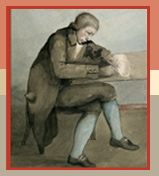
Iolo's People
Edward 'Celtic' Davies (1751-1831)
Evan Davies (Myfyr Morganwg, 1801-88)
Walter Davies (Gwallter Mechain, 1761–1849)
T C Evans (Cadrawd, 1846-1914)
Owen Jones (Owain Myfyr, 1741–1814)
Sir John Morris Jones (1864-1929)
William Owen Pughe (1759-1835)
William John Roberts (Gwilym Cowlyd, 1828-1904)
David Samwell (Dafydd Ddu Feddyg, 1751–98)
David Thomas (Dafydd Ddu Eryri, 1759–1822)
Griffith John Williams (1892-1963)
John Williams (Ab Ithel, 1811-62)
Evan Evans (1731-88)
Evan Evans was a priest, scholar and a poet, who was also known by the bardic names Ieuan Fardd (John the Poet) and Ieuan Brydydd Hir (John the Tall Poet). A native of the parish of Lledrod, Ceredigion, he was one of the brightest pupils of Edward Richard in Ystradmeurig school in the same county. Educated at Merton College, Oxford, from 1751 to 1754, he was ordained as a priest after graduating, and followed a nomadic career in parishes throughout Wales and England. Evans tended towards depression and he once attempted suicide. He also had a reputation as a heavy drinker and this, together with his public condemnation of Wales's Anglo bishops, hindered his advancement within the Church.
In his teens Evan Evans had come to the attention of Lewis Morris, who trained him in the art of Welsh strict-metre poetry and the correct manner of transcribing manuscripts. Evans's contributions to Welsh scholarship of his day are many. He rediscovered important early texts ('Y Gododdin' by Aneirin and the poetry of Taliesin), and published a selection of early Welsh poetry and a valuable essay on the Welsh bardic tradition, 'Dissertatio de Bardis', in the authoritative volume Some Specimens of the Poetry of the Ancient Welsh Bards (1764). This volume brought him acclaim and he became acquainted with luminaries of the Celtic movement in England: Daines Barrington, Thomas Gray and Thomas Percy. Evan Evans is therefore considered a vital link between the neo-classical movement and the Romantic movement in Wales. He spent the last years of his life in his native county, forced by poverty to depend on the generosity of others. From 1771 to 1778 he received an annual income from Sir Watkin Williams Wynn, Wynnstay. He later received a pension from the antiquary Paul Panton of Plas Gwyn, and following Evans's death his manuscripts were transferred to Panton's care.
Iolo was a great admirer of Evan Evans as a poet and considered him a leading authority on the Welsh bardic tradition. Indeed, he was an important influence on Iolo's ideas on this subject. The only surviving letter from Iolo to Evans gives a clear impression of the nature of their shared interests: the Romans in Britain, Dafydd ap Gwilym, Welsh metrics, periods in the development of the Welsh bardic tradition, and druidism. NLW 21319E, Iolo Morganwg to Evan Evans, 1 April 1779 It is likely that at this early stage, many of Iolo's ideas regarding the Welsh bardic tradition in general were developed in conversation and in correspondence with Evans. Moreover, Iolo's own bardic vision fulfilled the same aim as Evans's earlier English poem, 'Love of our Country' (1772), that is, defending Wales and the Welsh against the deeply-held prejudice and ignorance of the English.
Iolo spent much time in Evans's company in the late 1770s and early 1780s and he intimated that Evans was a member of Brodoliaeth Beirdd Morganwg (The Fraternity of Glamorgan Bards), the Welsh society he attempted to establish in Glamorgan around 1780. Evans regaled Iolo with anecdotes about Lewis Morris and Edward Jones. These tales were mainly concerned with the circumstances surrounding 'Celtic Remains', Lewis Morris's ignorance of the Latin and his duplicitous nature NLW 13118B, p. 105. The tales he heard from Evans concerning these two men unquestionably coloured Iolo's judgement of them. In 1813 Iolo claimed that both he and Evans had visited Gwernyclepa, the seat of Ifor Hael (Ivor the Generous) one of Dafydd ap Gwilym's principal patrons. Somewhat unkindly Iolo claimed that Evans, whose englynion to Ifor Hael sealed his reputation as a poet, had shown little interest in the physical remains of the place NLW 21285E, Letter 895, Iolo Morganwg to Taliesin Williams, 16-17 August 1813 - an excellent example of Iolo's fickle nature. Although he had transcribed material from Evans's manuscripts and benefited from Evans's scholarly knowledge, Iolo could also be unnecessarily judgemental of his friend. For example, he described Lewis Morris, Richard Morris, Evan Evans and Goronwy Owen as 'the would-be antiquarian Junto' who had placed Lewis Morris's 'Celtic Remains' on, in Iolo's view, an unworthy pedestal. Iolo's criticism of Evans's stiff poetic language and unreliability as a copier of manuscripts was also unwarranted.


